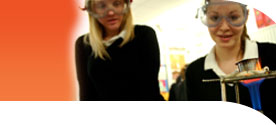



To make good progress pupils need continuity and opportunities for development across the key stages. To achieve this, curriculum planning at key stage 3 needs to:
During key stage 2 pupils learn about a wide range of living things, materials and phenomena. They begin to make links between ideas and to explain things using simple models and theories. They apply their knowledge and understanding of scientific ideas to familiar phenomena, everyday things and their personal health. They begin to think about the positive and negative effects of scientific and technological developments on the environment and in other contexts. They carry out systematic investigations, working on their own and with others. They use a range of reference sources in their work. They talk about their work and its significance and communicate ideas using a wide range of scientific language, conventional diagrams, charts and graphs.
By the end of key stage 2, most pupils are able to carry out systematic investigations. They are able to ask questions that can be investigated scientifically, consider what evidence needs to be collected, and what equipment and materials need to be used. They are able to offer predictions and make a fair test. They are able to make observations and measurements using ICT where appropriate and identify the need to repeat where necessary. They are able to communicate data in a wide range of diagrammatic, tabular and graphical forms, identifying relationships in data and drawing conclusions. They are able to use their scientific knowledge and understanding to explain data and are able to evaluate work and describe its significance and limitations.
During key stage 3 pupils build on their scientific knowledge and understanding and make connections between different areas of science. They use scientific ideas and models to explain phenomena and events and to understand a range of familiar applications of science. They think about the positive and negative effects of scientific and technological developments on the environment and in other contexts. They take account of others' views and understand why opinions may differ. They do more quantitative work, carrying out investigations on their own and with others. They evaluate their work, in particular the strength of the evidence they and others have collected. They select and use a wide range of reference sources. They communicate clearly what they do and its significance. They learn how scientists work together on present-day scientific developments and about the importance of experimental evidence in supporting scientific ideas.
By the end of key stage 3, most pupils are able to carry out more advanced systematic investigations. They are able to use their scientific knowledge and understanding to turn ideas and models into appropriate investigative approaches and decide whether evidence from primary or secondary resources should be used. They are able to carry out preliminary work to help inform predictions and consider the key variables that need to be taken into account. They are able to consider how evidence may be collected in contexts in which the variables cannot be readily controlled. They are able to decide on the extent and range of data to be collected in order to reduce error and obtain reliable evidence. When presenting and considering evidence, they are able to use more quantitative approaches such as drawing graphs with lines of best fit. They are able to consider anomalies and offer explanations for them, and are able to consider whether evidence is sufficient to support conclusions made. In their evaluative work, they are able to suggest improvements that could be made.
During key stage 4 pupils learn about the way science and scientists work within society. They consider the relationships between data, evidence, theories and explanations, and develop their practical, problem-solving and enquiry skills, working individually and in groups. They evaluate enquiry methods and conclusions both qualitatively and quantitatively, and communicate their ideas with clarity and precision.
All pupils develop their ability to relate their understanding of science to their own and others' decisions about lifestyles, and to scientific and technological developments in society.
Most pupils also develop their understanding and skills in ways that provide the basis for further studies in science and related areas.